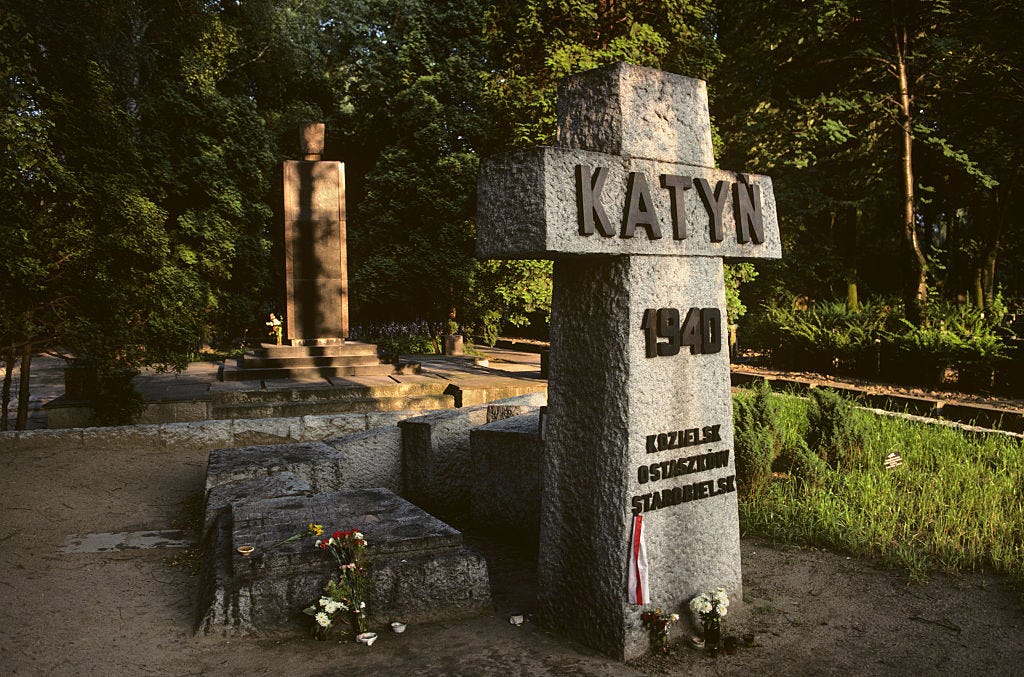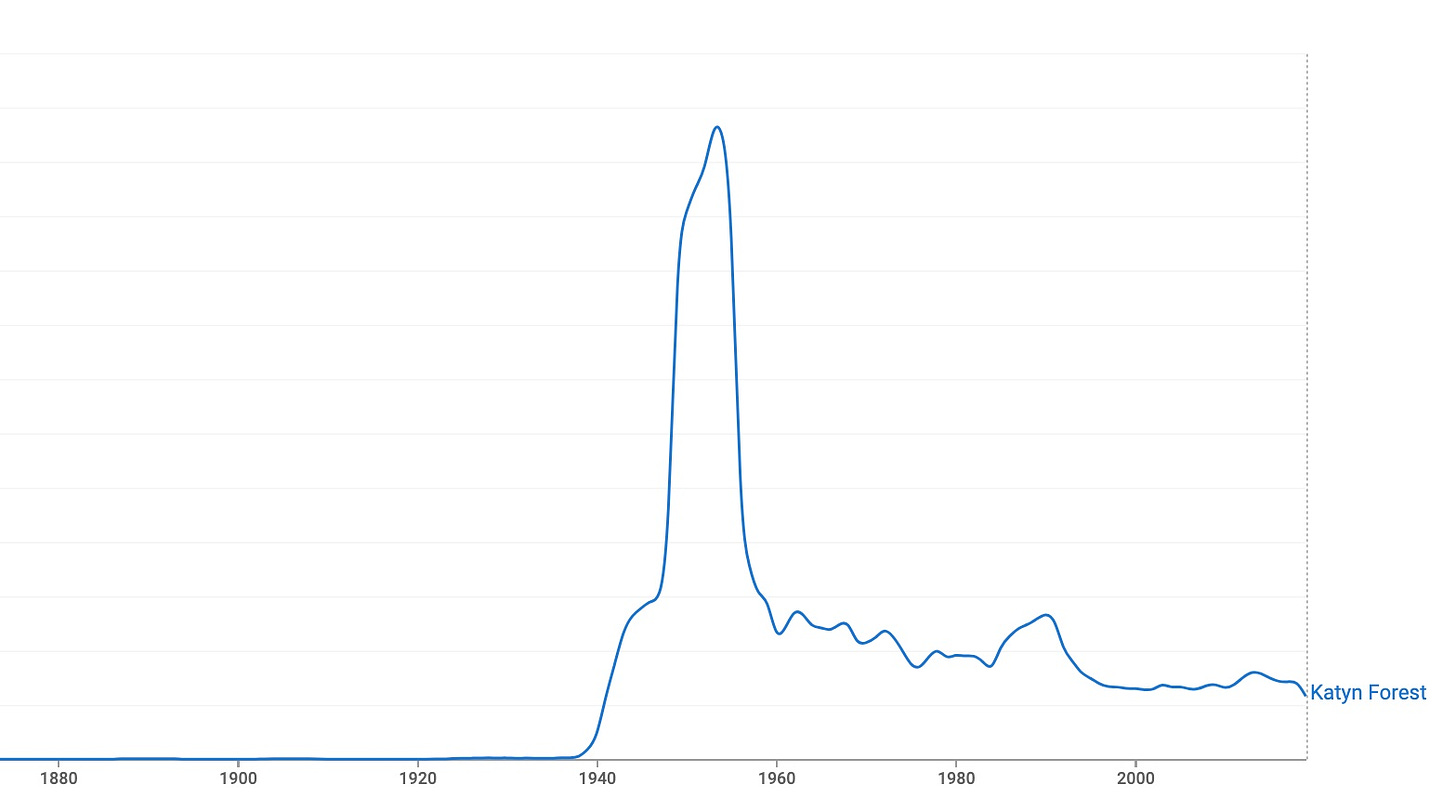Guest Post: Another Katyn Massacre, Another Srebrenica
Putin is failing in his goal of expanding Russia's borders. His only ‘victory’ is recreating the very worst of the old Soviet state.

Last month I put up two posts about Ukraine and Russia by my brother, Tom Fallows, a life-long scholar of Russian affairs.1 They were “Kiev in the 1970s, and Kyiv Now,” and “The Street Sense to Recognize a Gangster.”
This past weekend, as evidence emerged of mass civilian executions by Russian troops in the Ukrainian city of Bucha, Tom wrote about a historical connection that will immediately occur to many people in the region. That is the Katyn Forest Massacre, in 1940.
In America of the Cold War era, this was a well-known episode. I had a history class about it in junior high school, from a teacher who had been part of the Allied forces on D-Day. Politicians, preachers, and editorial writers in those years would use the name “Katyn Forest” and assume audiences would know what they were talking about.
Time rolls on, and it is a much less familiar reference these days. Just now I checked the Google Ngram viewer (which tracks word-use frequency in books) and it confirmed what I thought. This is the pattern for mentions of “Katyn Forest” in American English.
But in Poland and throughout Europe, the reference remains more vivid. The Google Ngrams also track many European languages, though not Polish, and the ones I checked show more sustained mentions of Katyn.
The two essential points about this event are that in 1940, thousands of Polish soldiers and officers being held as prisoners of war were systematically executed, mainly by bullets to the back of the head. And that for decades Soviet officials falsely maintained that invading Nazi forces had done the killing. The outside world concluded otherwise very quickly. But not until 1990, under Mikhail Gorbachev, did the Soviet government admit that its own security forces had murdered the Poles. Further background on the massacre is here from Britannica, here from History.com, here from the National Archives, and here from an informative Wikipedia entry.
Before turning the stage over to Tom, one other note. The photo at the top of this post is of a Katyn memorial at a Polish military cemetery in Warsaw. The actual killings occurred in the Katyn Forest in Russia, some 500 miles to the east. I am using this photo because available images of bodies at the Katyn Forest mass grave site are too gruesome and horrific to show up unbidden in anyone’s email inbox.
They are like some of the images we are seeing now from Bucha.
Bucha, Katyn, and Srebrenica
Where Putin May Be Worse than Stalin
By Thomas S. Fallows
The world is confronting the shocking news of Russian military withdrawal out of the outskirts of Kyiv exposing areas of civilian atrocities in the village of Bucha (executions of civilians, people found shot with their hands tied, and a mass grave where an estimated 150 civilians were buried in a crude ditch). This news can only enrage anybody who cares about humanitarian civilian protection. Already a week ago, President Biden publicly referred to war crimes by Russians in Ukraine, but now we are seeing worse things: now a mass grave site.
In such a short time (the war began only in late February), Putin’s Russia has come a long way to returning to Soviet standards. Putin has already set up an internal regime of totalitarian legal and police-based control of the population, with full restrictions on the media and total propaganda by state-owned media outlets which monopolize news information for most of the Russian population. And now we have another example of a repeat of the USSR story: mass criminal executions done by Russian soldiers against their enemy
With the movement backwards of the Russian fronts in Ukraine, the world is witnessing sights of Russian massacres of Ukrainian civilians. Like a chapter in Soviet history, here again we have a retreating Russian army, leaving behind cemeteries of victims of their occupation. The Ukrainian case of Bucha reminds me of the shallow graves found by Germans in 1940 when Soviet soldiers abandoned an area near the Katyn Forest near Smolensk close to the Russian-Byelorussian border. It was here where Soviet officials assassinated in 1940 a vast number of Polish officers captured during the Nazi/Soviet invasion of Poland in 1939.
The discovery of a mass grave can serve as an immensely powerful media symbol. Media reaction to the criminality of the Katyn Forest massacre came slowly, because the discovery of the massacre was revealed by the Nazis (allowing the Soviets to reply falsely that the murderers were Germans, not Russians). Russia acknowledged its responsibility for the Katyn massacre only in 1990 in the last days of the Soviet Union. Things are different in 2022 where the entire world has witnessed the atrocities and Russia cannot at all credibly argue that their enemy was responsible for the crime.
The Katyn massacre was so much worse than the recent Ukrainian atrocities, in terms of the enormous numbers of Polish officers executed (over 20 thousand victims). Katyn was also unusual as a clear act of political calculation to ensure Soviet control of the future Polish government (the Soviets wanted to liquidate the Polish leadership which could have emerged from their officer corps). The NKVD (the term for the Soviet political security force under Stalin at this time of World War II) led the mass execution effort, and the orders for the mass executions came directly from the Kremlin.
Bucha is similar, but in one way could be considered more reprehensible. The numbers of innocent murdered civilians are much less than the number of Polish officers of Katyn. But if we add the number of other Ukrainian civilian victims of Russian violence (witness the devastation of Mariupol), we start to come close to the magnitude of the Katyn atrocities.
So perhaps the numbers are not so different. But what is different about Bucha is that the execution of these Ukrainians serves no interest whatsoever for grander political/strategic considerations. Stalin at least had a rationale to order the execution of future Polish leadership who could threaten the USSR after the war. But what in the world is the benefit for Vladimir Putin to kill all these civilians in towns under control of Russian soldiers?
Instead of a parallel to Katyn (which had a deliberate political purpose directly ordered by Stalin and his lieutenants), could one see a possible parallel to Bucha in the 1995 slaughter of Bosnian civilians by Bosnian Serbs in the village of Srebrenica? Unlike Katyn, the Srebrenica massacre was done without any military logic. The only motivation was genocide: a clear effort to eradicate a mass of civilians, simply because they were different.
Ukrainian President Zelenskyy correctly used the term “genocide” in describing the Russian atrocities of 2022, but the Ukrainian atrocities strike me as an unusual form of genocide: the murderers and victims in Bucha were both Slavic peoples and were both Orthodox Christians, so there was no typical racial or religious force behind the massacre. Here the only difference between the killers and victims appears to be a different Slavic language. Slav versus Slav, Orthodox versus Orthodox, the only difference is language. So, Putin’s massacres of 2022 have opened an unusually new chapter in the history of genocide.
What has happened to the country of Tolstoi, Chekhov, Pushkin, Lermontov, Tchaikovskii, Dostoevskii and so many other gems of Russian culture? Here we have true irony. Putin’s goal has been to bring the world back to the pre-1991 world in which the USSR had an empire. Putin is failing this goal, in his desire to expand Russia’s boundaries. But in Putin’s totalitarian control of the Russian population and launching a series of massacres of civilians, Russia is really returning to the days of the USSR. In that sense, Putin can declare “victory” in his goal to recreate the world pre-1989.
As noted in the previous posts, Tom has a PhD in Russian history from Harvard, is a Russian speaker, and has been there many times from the 1970s onward.





What comes to mind for me is a movie about what nuclear war I saw many years ago, but I have never forgotten the tag caption on the screen at the end: "Will the survivors envy the dead?"
These are my $6.00 thoughts...
So, what you're saying, to make the comparison between Katyn and Bucha capable of existing in anything remotely resembling a rational universe, is that the killings at Bucha were a deliberate state policy of Russia. Those killed in Ukraine were selected using criteria established by the Russian government in order to support a national political strategy. The victims of this atrocity were killed because they would have...
waiting for it ...
waiting ...
Still waiting ...
Nothing.
Other than the Russian military killing people, there’s not much to compare.
Your brother's "revelations" on Katyn are not news to me, especially when you look at the structure and accession processes of the Polish military in the 1930s -- and also keeping 1920 in mind. Instead of making this bogus comparison (which fails to stand on its own even as printed) perhaps your brother (or even you) should have just concentrated on the facts of Bucha as they are emerging and limited the comparison to similar incidents initiated by the Russian military over the years. There are plenty to choose from without digging deep into the "Bogus Box".
Note: As regards the larger conflict picture, 1920 (the Battle of Warsaw) does have something to offer. Perhaps your brother's attention could be guided in that direction, offering us analysis a little more focused, and avoiding minefields of his own making.